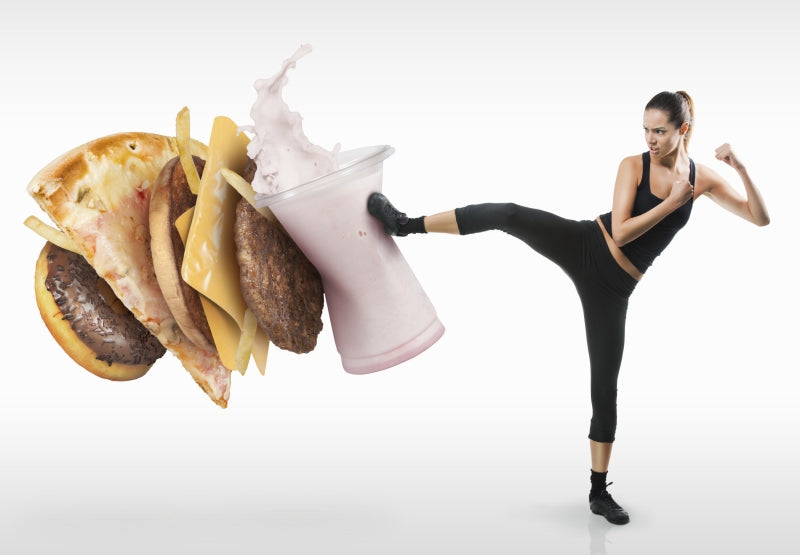
Pocket Guide to Calories, BMR & Daily Intake Requirements
Sometimes you get the results you want and sometimes you don't. Everybody has different nutritional needs so following a diet plan that's not tailored to those needs is rarely a good idea. The good news is that you can always make changes to a diet plan based on your individual needs as long as you know what changes need to be made.
This can be very tricky for some people if they lack a basic knowledge of nutrition. The idea here is to start building the foundation of knowledge that you will need to be successful in reaching your nutrition goals. So what's the first thing you need to know? The basic concept of calories is a good place to start.
The Basics of Calories
 People actually know very little about calories. Most know they come from food and that's about it. But there is so much more:
People actually know very little about calories. Most know they come from food and that's about it. But there is so much more:- What exactly is a calorie?
- How many calories should you eat?
- Etc.
Calories are so small that a medium banana has about 105,000 of them. But you don't see that on a nutrition label because we measure food in kilocalories. Kilo means 1000, so a 105,000 calorie banana is read as 105 kilocalories.
Most food labels tend to leave off the kilo (or k when abbreviating) and just say calories. It doesn't matter what the label says, whether it is reads calorie or kilocalorie. They mean the same thing on food labels.
How Many Calories Do You Need?
Now that you understand exactly what a calorie is, the next thing to know is how many you need.
There are a lot of factors that influence how many calories you need per day; your age, gender, activity level, and more. All these play a part in determining you daily calorie needs. There is really no way to determine you exact calorie needs without some trial and error but there are a few tricks to get you in the ballpark of where you need to be.
The Harris Benedict Equation
A common method is a math formula called the Harris Benedict Equation. This equation is a 2 step process; the first step is determining you Basal metabolic rate or BMR. The BMR is the amount of calories your body needs each day to sustain life when you are completely at rest.
If you take in more energy (calories) than you need your body will store it for later use as fat.You will need to plug your gender, weight, height, and age into the equation.
- Men: 66 + (6.23 x weight in pounds) + (12.7 x height in inches) - (6.76 x age in years)
- Women: 655 + (4.35 x weight in pounds) + (4.7 x height in inches) - (4.7 x age in years)
- 66 + (6.23x 265) + (12.7x72) - (6.76x30) = 2429 BMR
- If you never exercise use BMR x 1.2
- If you exercise 1-3 days a week use BMR x 1.375
- If you exercise 4-5 days a week use BMR x 1.55
- If you?re a gym rat that trains 6-7 days a week BMR x 1.55
- And If you train all day every day BMR x 1.9
Keep in mind that the number you come up with in the end is only an estimate and you may have to adjust it a little based on what the weight scale says every few weeks. This estimate of how many calories a day you need to maintain your body weight is what we?ll call maintenance calories.
We Know Our Calorie Requirements - Now What?
 So what are you supposed to do with this number? That would depend on what your goal is.
So what are you supposed to do with this number? That would depend on what your goal is.If you take in more energy (calories) than you need your body will store it for later use as fat. On the other hand, if you take in less energy than your body needs then it will dip into its energy stores and you will lose fat.
Weight Loss Adjustments
So, if you are trying to lose weight (cutting) you need to eat less than your maintenance calories. There is about 3,500 calories in a pound of fat so if you eat 500 calories a day below maintenance than you lose around a pound every 7 days (500 x 7 = 3,500). You could adjust the calories to lose weight faster or slower but generally most people don't try to lose more than 1 or 2 pounds a week.Weight Gain Adjustments
On the other hand, if you are trying to gain weight (bulking) then your body is going to need extra energy to build all that muscle so you want to eat more calories than your maintenance. The trick is not to increase your calorie intake too much too fast. It is best to increase your daily calories gradually and keep an eye on the scale.You can only put on muscle so fast and if the scale says your gaining 4 or 5 lbs a week then decrease your calorie intake until you are at about 1-2 lbs a week. Keep in mind that there will still be some fat gain but keep it in check when on a bulk. Remember, the more you put on bulking, the more you have to take off cutting.
The 3 Macronutrients - Protein, Fats and Carbs
The next thing you need to know is where to get your calories from. Here is the breakdown for each of the 3 macronutrients:- Carbohydrates (4 calories per gram)
- Protein (4 calories per gram),
- Fat (9 calories per gram)
The body uses each of these nutrients for different things so it is important to get the proper ratios of each one. But this is a topic for another day. For now the important things to take away is that you need to know how many calories a day your body needs.
If you want to get bigger, eat more. And if you want to get small, eat less.
Wes Mayeux






